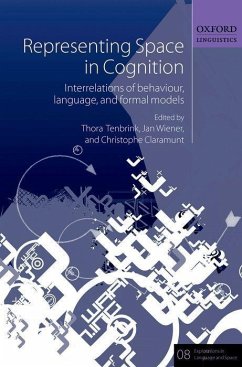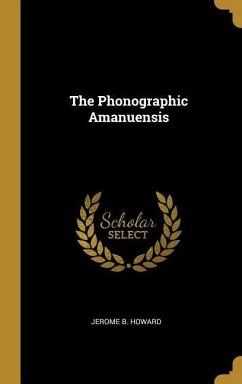Thora Tenbrink, Jan M. Wiener, Christophe Claramunt
Representing Space in Cognition: Interrelations of Behaviour, Language, and Formal Models
Thora Tenbrink, Jan M. Wiener, Christophe Claramunt
Representing Space in Cognition: Interrelations of Behaviour, Language, and Formal Models
- Gebundenes Buch
- Merkliste
- Auf die Merkliste
- Bewerten Bewerten
- Teilen
- Produkt teilen
- Produkterinnerung
- Produkterinnerung
This book considers how people talk about their environment, find their way in new surroundings, and plan routes. Leading scholars and researchers in psychology, linguistics, computer science, and geography show how empirical research can be used to inform formal approaches towards the development of intuitive assistance systems.
Andere Kunden interessierten sich auch für
![Poems. by William Mason, M.A: Containing, Odes, Elegies, Dramatic Pieces, &C. to This Dublin Edition Are Added, I. Isis: An Elegy. Ii. an Ode Perfor Poems. by William Mason, M.A: Containing, Odes, Elegies, Dramatic Pieces, &C. to This Dublin Edition Are Added, I. Isis: An Elegy. Ii. an Ode Perfor]() William MasonPoems. by William Mason, M.A: Containing, Odes, Elegies, Dramatic Pieces, &C. to This Dublin Edition Are Added, I. Isis: An Elegy. Ii. an Ode Perfor37,99 €
William MasonPoems. by William Mason, M.A: Containing, Odes, Elegies, Dramatic Pieces, &C. to This Dublin Edition Are Added, I. Isis: An Elegy. Ii. an Ode Perfor37,99 €![Old Country and Farming Words: Gleaned From Agricultural Books Old Country and Farming Words: Gleaned From Agricultural Books]() James BrittenOld Country and Farming Words: Gleaned From Agricultural Books37,99 €
James BrittenOld Country and Farming Words: Gleaned From Agricultural Books37,99 €![Integrational Linguistics Integrational Linguistics]() Maria Manoliu-ManeaIntegrational Linguistics208,99 €
Maria Manoliu-ManeaIntegrational Linguistics208,99 €![Aesthetic as Science of Expression and General Linguistic Aesthetic as Science of Expression and General Linguistic]() Benedetto CroceAesthetic as Science of Expression and General Linguistic39,99 €
Benedetto CroceAesthetic as Science of Expression and General Linguistic39,99 €![The Book of Entertainment, of Curiosities and Wonder in Nature, Art, and Mind The Book of Entertainment, of Curiosities and Wonder in Nature, Art, and Mind]() AnonymousThe Book of Entertainment, of Curiosities and Wonder in Nature, Art, and Mind56,99 €
AnonymousThe Book of Entertainment, of Curiosities and Wonder in Nature, Art, and Mind56,99 €![Cosmos: Sketch of a Physical Description of the Universe, Tr. Under the Superintendence of E. Sabine. 4 Vols. [In 5] Cosmos: Sketch of a Physical Description of the Universe, Tr. Under the Superintendence of E. Sabine. 4 Vols. [In 5]]() AnonymousCosmos: Sketch of a Physical Description of the Universe, Tr. Under the Superintendence of E. Sabine. 4 Vols. [In 5]44,99 €
AnonymousCosmos: Sketch of a Physical Description of the Universe, Tr. Under the Superintendence of E. Sabine. 4 Vols. [In 5]44,99 €![The Phonographic Amanuensis The Phonographic Amanuensis]() Jerome B. HowardThe Phonographic Amanuensis37,99 €
Jerome B. HowardThe Phonographic Amanuensis37,99 €-
-
-
This book considers how people talk about their environment, find their way in new surroundings, and plan routes. Leading scholars and researchers in psychology, linguistics, computer science, and geography show how empirical research can be used to inform formal approaches towards the development of intuitive assistance systems.
Produktdetails
- Produktdetails
- Explorations in Language and S
- Verlag: Hurst & Co.
- Seitenzahl: 352
- Erscheinungstermin: 31. Dezember 2013
- Englisch
- Abmessung: 236mm x 160mm x 28mm
- Gewicht: 658g
- ISBN-13: 9780199679911
- ISBN-10: 0199679916
- Artikelnr.: 37783157
- Herstellerkennzeichnung
- Libri GmbH
- Europaallee 1
- 36244 Bad Hersfeld
- 06621 890
- Explorations in Language and S
- Verlag: Hurst & Co.
- Seitenzahl: 352
- Erscheinungstermin: 31. Dezember 2013
- Englisch
- Abmessung: 236mm x 160mm x 28mm
- Gewicht: 658g
- ISBN-13: 9780199679911
- ISBN-10: 0199679916
- Artikelnr.: 37783157
- Herstellerkennzeichnung
- Libri GmbH
- Europaallee 1
- 36244 Bad Hersfeld
- 06621 890
Thora Tenbrink is a Lecturer in Cognitive Linguistics at Bangor University (Wales, UK). She worked for ten years as a research scientist at the Faculty of Linguistics at Bremen University (Germany), and is a principal investigator in two projects in the Collaborative Research Center SFB/TR 8 Spatial Cognition (Bremen/Freiburg). Her main interest concerns the relationship between cognitive processes and linguistic representations. She is the author of Space, Time, and the Use of Language (Mouton de Gruyter, 2007), and editor, with Kenny Coventry and John Bateman, of Spatial Language and Dialogue (OUP, 2009). Jan Wiener is a Senior Lecturer in Psychology at the University of Bournemouth (UK). Previously he has worked as a research scientist at the University of Freiburg (Germany), the CNRS (Paris, France), and the Max-Planck-Institute for Biological Cybernetics (Tübingen, Germany). His research focuses primarily on the cognitive processes and strategies that underly navigation and wayfinding behaviour. Christophe Claramunt is a Professor in Computer Science and Chair of the Naval Academy Research Institute in France. He was previously a Senior Lecturer in Computing at the Nottingham Trent University and a Senior Researcher at the Swiss Federal Institute of Technology in Lausanne. He holds a PhD in Computer Science from the University de Bourgogne in France. His main research interests concern theoretical and multi-disciplinary aspects of geographical information science, including spatio-temporal and computational models, alternative models of space, semantic GIS, integration of GIS and simulation systems, and the spatial Web.
* 1: Thora Tenbrink, Jan Wiener, and Christophe Claramunt: Introduction
* Part I: Empirical Insights
* 2: Holly Taylor and Tad T. Brunyé: Describing the Way Out of a
Cornfield: Understanding congitive underpinnings of comprehending
survey and route descriptions
* 3: Marios Avraamides, Catherine Mello, and Nathan Greenauer: Spatial
Representations for Described and Perceived Locations
* 4: Michel Denis and Gilles Fernandez: The Processing of Landmarks in
Route Directions
* Part II: Computational Models
* 5: Michael Barclay and Antony Galton: Selection of Reference
Objectives for Locative Expressions: The importance of knowledge and
perception
* 6: Eric Chown: Spatial prototypes
* 7: Parisa Kordjamshidi, Joana Hois, Martijn van Otterlo, and
Marie-Francine Moens: Learning to Interpret Spatial Natural Language
in Terms of Qualitative Spatial Relations
* Part III: Intuitive Assistance
* 8: Inessa Seifert and Thora Tenbrink: Cognitive Operations in Tour
Planning
* 9: mathieu Gallay, Michel Denis, and Malika Auvray: Navigation
Assistance for Blind Pedestrians: Guidelines for the design of
devices and implications for spatial cognition
* 10: Nhung Nguyen and Ipke Wachsmuth: A Computational Model of
Cooperative Spatial Behaviour for Virtual Humans
* 11: Mehul Bhatt, Carl Schultz, and Christian Freksa: The 'Space' in
Spatial Assistance Systems: Conception, formalisation, and
computation
* Part I: Empirical Insights
* 2: Holly Taylor and Tad T. Brunyé: Describing the Way Out of a
Cornfield: Understanding congitive underpinnings of comprehending
survey and route descriptions
* 3: Marios Avraamides, Catherine Mello, and Nathan Greenauer: Spatial
Representations for Described and Perceived Locations
* 4: Michel Denis and Gilles Fernandez: The Processing of Landmarks in
Route Directions
* Part II: Computational Models
* 5: Michael Barclay and Antony Galton: Selection of Reference
Objectives for Locative Expressions: The importance of knowledge and
perception
* 6: Eric Chown: Spatial prototypes
* 7: Parisa Kordjamshidi, Joana Hois, Martijn van Otterlo, and
Marie-Francine Moens: Learning to Interpret Spatial Natural Language
in Terms of Qualitative Spatial Relations
* Part III: Intuitive Assistance
* 8: Inessa Seifert and Thora Tenbrink: Cognitive Operations in Tour
Planning
* 9: mathieu Gallay, Michel Denis, and Malika Auvray: Navigation
Assistance for Blind Pedestrians: Guidelines for the design of
devices and implications for spatial cognition
* 10: Nhung Nguyen and Ipke Wachsmuth: A Computational Model of
Cooperative Spatial Behaviour for Virtual Humans
* 11: Mehul Bhatt, Carl Schultz, and Christian Freksa: The 'Space' in
Spatial Assistance Systems: Conception, formalisation, and
computation
* 1: Thora Tenbrink, Jan Wiener, and Christophe Claramunt: Introduction
* Part I: Empirical Insights
* 2: Holly Taylor and Tad T. Brunyé: Describing the Way Out of a
Cornfield: Understanding congitive underpinnings of comprehending
survey and route descriptions
* 3: Marios Avraamides, Catherine Mello, and Nathan Greenauer: Spatial
Representations for Described and Perceived Locations
* 4: Michel Denis and Gilles Fernandez: The Processing of Landmarks in
Route Directions
* Part II: Computational Models
* 5: Michael Barclay and Antony Galton: Selection of Reference
Objectives for Locative Expressions: The importance of knowledge and
perception
* 6: Eric Chown: Spatial prototypes
* 7: Parisa Kordjamshidi, Joana Hois, Martijn van Otterlo, and
Marie-Francine Moens: Learning to Interpret Spatial Natural Language
in Terms of Qualitative Spatial Relations
* Part III: Intuitive Assistance
* 8: Inessa Seifert and Thora Tenbrink: Cognitive Operations in Tour
Planning
* 9: mathieu Gallay, Michel Denis, and Malika Auvray: Navigation
Assistance for Blind Pedestrians: Guidelines for the design of
devices and implications for spatial cognition
* 10: Nhung Nguyen and Ipke Wachsmuth: A Computational Model of
Cooperative Spatial Behaviour for Virtual Humans
* 11: Mehul Bhatt, Carl Schultz, and Christian Freksa: The 'Space' in
Spatial Assistance Systems: Conception, formalisation, and
computation
* Part I: Empirical Insights
* 2: Holly Taylor and Tad T. Brunyé: Describing the Way Out of a
Cornfield: Understanding congitive underpinnings of comprehending
survey and route descriptions
* 3: Marios Avraamides, Catherine Mello, and Nathan Greenauer: Spatial
Representations for Described and Perceived Locations
* 4: Michel Denis and Gilles Fernandez: The Processing of Landmarks in
Route Directions
* Part II: Computational Models
* 5: Michael Barclay and Antony Galton: Selection of Reference
Objectives for Locative Expressions: The importance of knowledge and
perception
* 6: Eric Chown: Spatial prototypes
* 7: Parisa Kordjamshidi, Joana Hois, Martijn van Otterlo, and
Marie-Francine Moens: Learning to Interpret Spatial Natural Language
in Terms of Qualitative Spatial Relations
* Part III: Intuitive Assistance
* 8: Inessa Seifert and Thora Tenbrink: Cognitive Operations in Tour
Planning
* 9: mathieu Gallay, Michel Denis, and Malika Auvray: Navigation
Assistance for Blind Pedestrians: Guidelines for the design of
devices and implications for spatial cognition
* 10: Nhung Nguyen and Ipke Wachsmuth: A Computational Model of
Cooperative Spatial Behaviour for Virtual Humans
* 11: Mehul Bhatt, Carl Schultz, and Christian Freksa: The 'Space' in
Spatial Assistance Systems: Conception, formalisation, and
computation







![Cosmos: Sketch of a Physical Description of the Universe, Tr. Under the Superintendence of E. Sabine. 4 Vols. [In 5] Cosmos: Sketch of a Physical Description of the Universe, Tr. Under the Superintendence of E. Sabine. 4 Vols. [In 5]](https://bilder.buecher.de/produkte/66/66701/66701388m.jpg)
